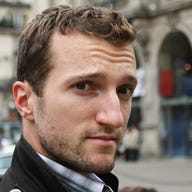Paris-based entrepreneurs to make deaf community heard

 PARIS – DEAFI, a French organization working to improve the landscape for deaf people is one of the finalists this year for Paris’ Grand Prix de l’Innovation, a city-sponsored award recognizing entrepreneurship and innovation.The company is one of the only organizations in France that helps train businesses to cater to the hearing impaired while helping deaf people gain greater access to more varied careers.
PARIS – DEAFI, a French organization working to improve the landscape for deaf people is one of the finalists this year for Paris’ Grand Prix de l’Innovation, a city-sponsored award recognizing entrepreneurship and innovation.The company is one of the only organizations in France that helps train businesses to cater to the hearing impaired while helping deaf people gain greater access to more varied careers.
Some 4 million people in France are either deaf or hearing impaired, but services directed towards this community have not been widespread.More importantly, few organizations directly hire deaf people to work in communications sectors that deal with the hearing impaired.A law passed in France in 2005 mandates hiring a certain number of employees with disabilities but companies were not universally prepared for deaf workers.
Founded in 2009, DEAFI – a hybrid of the English word “deaf” and the French word “défi” for challenge – originally sought to help deaf people access services previously unavailable to them.The organization uses webcams to allow deaf people to communicate through a signer to a person on the receiving end, allowing the same communication available on a telephone.DEAFI helps implement this and similar strategies in major businesses.
Over time, director Jean-Charles Correa realized that the deaf were disproportionately unemployed and wanted to help them find jobs working with other deaf people.“Instead of having hearing people who can read sign language, why not train deaf people to answer questions of other deaf people?” Correa said.
The organization began in Paris and quickly started to work with other businesses to develop awareness-programs, training initiatives, communication services, and eventually a sort of work-insertion program where DEAFI helps members of the deaf community find jobs within major corporations.The idea is to create a culture of customer service that is as welcoming to people no matter how much or little they can hear. “My strategy is first to show companies that businesswise it is a good thing to open themselves up to deaf people and to encourage them to hire these people,” Correa said.
Already partnered with major communications companies like SFR and Free, Correa hopes that his employees will eventually move away from DEAFI to pursue larger careers.“We want to promote the employability of deaf people,” he said.
Certain obstacles still remain as the small team of 19 tackles a rapidly changing communications terrain.Webcam signing services are currently only available for desktop or laptop computers for practical reasons, but Correa hopes to go mobile soon.“Even though using sign language from a mobile phone is not that easy, it’s something we are considering now,” he said.
DEAFI also addresses problems that are often overlooked among the deaf community. Especially among those born deaf, reading online text is not a given.Correa explains that sign language and written language can be drastically different.“French Sign Language is very different from French; it’s closer to German.There’s no tense, no gender,” he explained.
With his colleagues Correa has implemented a DEAFTAG, an icon located next to pages of text where a deaf person can watch a video of a signer signing the text, allowing for more comprehensive understanding of the oftentimes foreign-looking language.
Advances like the DEAFTAG have landed DEAFI in the top five for its category of innovative services in this year’s Grand Prix de l’Innovation.Another round of evaluation will help decided if the organization will take home the 15,000 euro prize and other promotional assistance for DEAFI.
In the meantime Correa and his team are focusing on continued training programs to help spread DEAFI across France.With an upcoming office in Lille, Correa hopes to be in Toulouse, Marseille, and any other French town with a significant deaf community in order to promote DEAFI’s mission.“Deaf people are all over the country,” he said.“We are trying to be as close as possible quality-wise as to what hearing people are getting.”
Photo: DEAFI
This post was originally published on Smartplanet.com